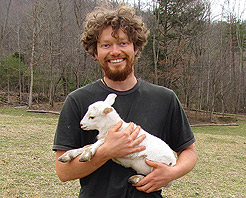
“Shake the hand that feeds you.”
In January, Holly Evans ’11 and her boyfriend, Randy Buck, left on an agricultural adventure: to spend a year traveling around the country WWOOFing. To the uninitiated, WWOOFING stands for World Wide Opportunities on Organic Farms, an organization that helps people volunteer on farms in return for food, accommodations, and the chance to learn about organic lifestyles. Evans and Buck hope to WWOOF their way around the world before eventually investing in their own land. At press time the couple had worked on 10 farms in Arkansas, Tennessee, Mississippi, and North Carolina. What follows are two excerpts from their blog.
Spring Creek Farm
Pioneer, Tennessee
We had one day to learn the routine at Spring Creek Farm before owners Adam and Shelby left with their kids for Florida. Showing us the ropes were two other WWOOFers who were headed to the farm we’d just left. Adam and Shelby had also left us a list, so we were kept busy planting, weeding, watering, transplanting, and caring for the sheep, chickens, ducks, geese, turkeys, cattle, and dogs.
Even though the vegetarian food at our last farm had been delicious, we eagerly anticipated the pasture-raised meat at Spring Creek Farm. Adam and Shelby granted us free access to their freezer full of meat and eggs, which we ravenously tore into. One day we had sausage in our breakfast omelet, lamb ribs for lunch, a ham sandwich for an after-work snack, and a boiled ham hock for dinner.
We love the picturesque Tennessee countryside; the farm is set in a beautiful valley with cows on one rolling hillside and sheep on the next. The farmland also includes a steep wooded mountainside and mountain springs, which provide pure, delicious drinking water.
On our last day we climbed a nearby ridge in search of morels. It was a little early, but the winter had been so mild we decided to try anyway. We found a good pound and a half of mostly blacks, but also some longnecks and whites. Unfortunately, some of the morels got squished as we slipped and slid down the hillside, but since Shelby and Adam don’t like morels, we got to eat all the unsellable ones.
Broken Magnolia Farm
Taylor, Mississippi
We were lucky enough to be here for the kidding season, and with a herd of 25 goats there was plenty to do. Now we have some limited goat skills, and feel comfortable drenching sick goats, identifying scouring goats, catching ornery goats, inter-muscularly injecting goats, and ear-tagging newborn goats.

The first doe that gave birth had twins, and when [farmer] Katherine found them in the morning, one was inside with the mama and the other was outside the barn shivering by itself. Katherine put the cold one inside her coat, and then I had it inside my coat, but even with a hot water bottle the baby wasn’t warming up fast enough. So we brought it inside, and after a few hours it was warm enough to go back to its mama.
Unfortunately, its mama did not accept it, probably because of the time lapse and the fact that it smelled like humans. Without its mama, the kid went downhill, getting listless and lethargic. Then Katherine tried to convince one of the other goats to adopt it: When another doe gave birth the next day, she smeared some of the placenta on the orphan—but the doe didn’t buy it. Luckily, a third doe saw the baby and started cleaning it up and letting it nurse.
The orphan doeling lived happily with its two siblings and adopted mama for several days, but then was found dead in the middle of the night. This was after another kid had also died, despite our attempts to save it. These two, along with two who were accidentally run over, meant that four kids died during the first week after kidding. This is apparently about average; there are always accidents and illnesses.
To read more and see Holly and Randy’s WWOOFing route, go to randyandhollysfarmingadventure.blogspot.com
July 11 2012
Back to top




